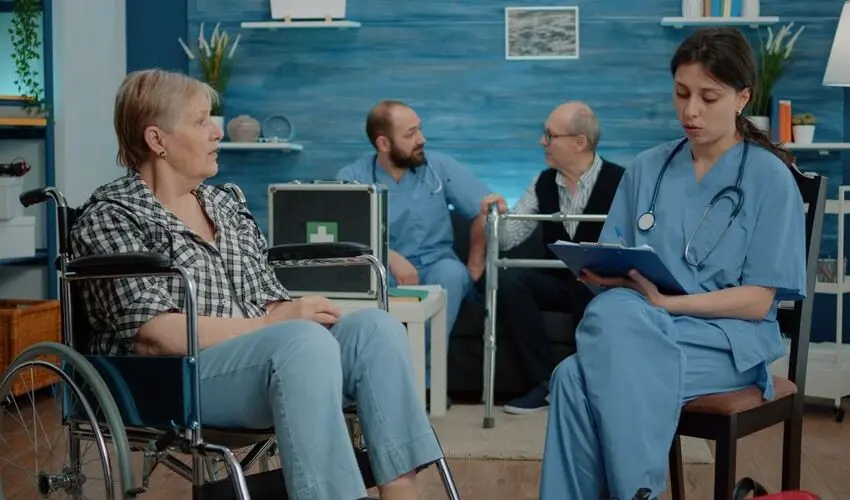Chronic diseases are among the leading causes of death and disability in the United States and account for most health care costs. Conditions such as diabetes, heart disease, high blood pressure, and chronic obstructive pulmonary disease (COPD) require ongoing treatment, patient involvement, and coordinated care. To address this increasing challenge, Medicare and Medicaid Services (CMS) introduced the Chronic Care Management (CCM) program in 2015. The program promotes coordinated, continuous care for Medicare recipients with two or more chronic conditions. To successfully implement CCM services, health professionals will need to undergo chronic care training, which is a key component in ensuring quality care and patient success.
Introduction
What is Medicare Chronic Care Management?
Medicare’s CCM program reimburses health professionals for services that are not face-to-face but support health and well-being for patients with chronic conditions. These services include care coordination, medication management, development of care plans, communication with patients and nurses, and ensuring follow-up with specialists. To qualify for reimbursement, providers should document these services for each patient every month. CCM aims to reduce hospital readmissions, improve clinical outcomes, increase patient satisfaction, and lower healthcare costs by keeping patients healthy and outside the hospital. However, to achieve these goals, providers and care teams must receive training on the complications of chronic care and the administrative requirements program.
The Significance of CCM Training
1. Make sure you complain and refund
Proper training ensures that the health care provider understands the medicine’s invoicing requirements, documentation protocols, and coding practices. Billing may have errors, audits, or financial punishment denied as a result of failure to fulfill the CMS guidelines. Training helps to ensure compliance and protects the economic integrity of a health practice.
2. Care ordering skills
Handling of chronic diseases requires a team-based approach. The CCM training provides skills in communication, coordination, and interdisciplinary collaboration for nurses, care leaders, and doctors. This ensures that each member of the care team is in line and works towards shared patient goals.
3. Effective use of health technology
Many CCM programs rely on electronic health records (EHR), distance patient monitoring equipment, and secure communication platforms. The training includes instructions to use these techniques effectively to maintain the patient’s progress, track care activities, and maintain compliance with HIPAA.
4. Improve the patient’s engagement
One of the most important aspects of CCM is to maintain frequent contact with patients and encourage them to participate in their care. Training helps develop techniques to educate, motivate, and strengthen patients to follow treatment plans, participate in agreements, and create healthy lifestyle options.
Large components of CCM training
A comprehensive Medicare CCM training program usually includes the following areas:
• CMS CCM program guidelines and invoicing requirements
• Development of a care plan including documentation of the patient’s goals and preferences,
• Patient’s qualifying and registration process
• Time tracking and best practice for service documentation
• The role and responsibility of the team in care coordination
• Legal and moral views, including patients’ consent and data security,
• Technology integration, such as EHR workflow and communication equipment
• Patient communication strategies and training in cultural qualification
Training is available through various channels, including online courses, workshops, webinars, and commercial seminars, often introduced by health associations, counseling companies, and educational institutions.
Advantages of CCM Training for Healthcare Patients and Providers
CCM training gradually increases both the supplier’s efficiency and patient results. Trained care teams are better equipped to handle the complications of chronic diseases, resulting in more personal care, lower emergency services, and a better health matrix for patients.
For health professionals, CCM training opens opportunities for further income streams, a strong reputation for improving patient loyalty, and quality care. In addition, it reduces the burnout of staff by promoting better workflows and clarifying responsibilities.
Conclusion
Medicare Chronic Care Management training is an important investment for any health organization that requires improving the results for patients with chronic conditions. Strengthening care teams with knowledge, skills, and equipment requires them to navigate old care complications. Training not only ensures compliance and financial stability but also contributes to a healthy, more patient population. Since the prevalence of chronic illness continues to increase, CCM training will remain an essential component of modern health care distribution.
Frequently Asked Questions (FAQs)
What is Medicare Chronic Care Management?
Medicare’s CCM program reimburses health professionals for services that are not face-to-face but support health and well-being for patients with chronic conditions. These services include care coordination, medication management, development of care plans, communication with patients and nurses, and ensuring follow-up with specialists. To qualify for reimbursement, providers should document these services for each patient every month. CCM aims to reduce hospital readmissions, improve clinical outcomes, increase patient satisfaction, and lower healthcare costs by keeping patients healthy and outside the hospital.
What are the benefits of Medicare Chronic Care Management?
- Make sure you complain and refund
- Care ordering skills
- Effective use of health technology
- Improve the patient’s engagement

